
After coming home from work during the week, I sometimes open the garage door to find my upstairs neighbor ready to greet me with one of her delicious meals. She’s shared lentil soup, banana bread, a lasagna inspired dish, pulled beef in mushroom sauce, cheesy potatoes, stuffed bell peppers, soup, homemade peanut brittle, and more with me! Even though we are not sitting down to eat the same thing, why does eating food shared by someone else feel so good to eat? Well maybe a part of it is because we appreciate the gesture and the time spent. However, food sharing and communal eating holds more weight than we may give it credit for.
We have shared food since the caveman days. Actually, eating together and sharing meals is theorized to be one of the most important activities cavemen did that promoted language development, social and self-awareness and collective learning. These social skills continue to encourage positive outcomes when sitting down for family dinners. Additionally, family meals provide opportunities for parents to model healthy eating behaviors, teach about appetite and fullness, and to expose children to a breadth of food choices and tastes; all of which contributes to the development of food and nutrition knowledge (Fieldhouse 2018). The higher the food and nutrition knowledge, the lower the likelihood children will grow to have nutrition-related diseases as they become autonomous and make their own food and meal choices (Brown et al, 2021). Young adults who grew up having regular family meals during their childhood and adolescence are linked to having better diet quality and are more likely to continue to prioritize their own family meals and seek out communal meal experiences once they are out of the nuclear home (Larson 2013).


The science behind the communal meal experience is pretty remarkable. The act of eating triggers the endorphin system, which when paired with others around you whose endorphin systems are also prompted, can greatly aid in even more enhanced endorphin effects. The enhanced endorphin effect occurs from being in sync with others, which has been related to the same enhanced effect as physical exercise (Cohen 2019). Communal eating is not of course, a substitute for exercise as it doesn’t include the physical benefits of getting your body to move, but why not enhance those endorphin reactions whenever possible? Endorphins are our bodies’ natural pain killers, reduce emotional stress and promote overall well-being.
Another cool thing that happens during communal meals, specifically if you’re eating the same food, is that trust and cooperation of the group are increased (Fishback 2019) One experiment of Fishback’s study was having the participants listen to someone offering a product testimonial. The person speaking was given food and the participant group that was given the same food as the speaker, were more likely to trust the speaker. The cooperation experiment is just as interesting, Fishback had volunteers eat the same food while they worked together to agree on a fake hourly wage in the roles of employees and union representatives. The volunteers given the same food reached an agreement quicker than those who ate different foods. Important side note, these volunteers were complete strangers- how freaking cool?

So, since March is national nutrition month, I hope you incorporate family and communal eating a little more often for opportunities to enhance your bonding, trust, cooperation and overall nutritional and mental health wellbeing. Or, if you have a neighbor, share some food with them!
Promise Community Health Center Mental Health Team
Promise Community Health Center offers a range of mental health services. Our mental health team collaborates with our patients to assess current coping skills, address emotional needs and work through lifelong patterns. These services are available on-site and by Telehealth by our mental health department.
Promise Community Health Center is proud to provide bilingual mental health therapy in northwest Iowa. Our bilingual therapist can provide mental health services in both English and Spanish. Promise also provides our patients with a mental health interpreter who is qualified to interpret into Spanish for Spanish speaking mental health patients. Our goal is to make sure that our patients are able to do mental health therapy in the language they feel most comfortable speaking. We are happy to have bilingual mental health therapists and counselors and a mental health interpreter to provide accessible and affordable bilingual therapy in Northwest Iowa.
What can Promise Community Health Center in Sioux Center mental health therapists help with:
- Developing & exploring effective coping skills
- Addressing emotional needs
- Working through lifelong patterns
- Working through difficult life situations
- Developing better communication skills
- and so much more!
Our mental health therapists and counselors in Sioux Center provide many therapies including:
- Individual Therapy
- Child Therapy
- Adolescent Therapy
- Couples Therapy
- Women’s Issues Therapy
- Online Therapy
- Family Therapy
Our Promise mental health therapists are specialized and trained in many different therapies including:
- Anxiety Therapy
- Trauma Therapy
- A.R.T.- Accelerated Response Therapy
- EMDR- Eye Movement Desensitization and Reprocessing Therapy
- Art Therapy
- DBT- Dialectical Behavior Therapy
- Generational Family Therapy
- Complex Trauma Therapy
- CBT- Cognitive Behavioral Therapy
- Trauma Services Therapy
- Post-Traumatic Stress Disorder Therapy
Our Sioux Center therapists and counselors are offering services to the following in our northwest Iowa communities:
- Children- Ages 8 and older
- Adolescents
- Adults
- Couples
- Families
Some of our mental health therapy patients come from Sioux Center, Rock Valley, Inwood, and Rock Rapids. We also provide mental health therapy and counseling for patients from Boyden, Hull, Sheldon, George, Sibley, and Spencer. Patients needing mental health therapy or counseling also come from Le Mars, Orange City, Alton, Hawarden, and Hudson. Promise is proud to provide mental health therapy and counseling to northwest Iowa.

